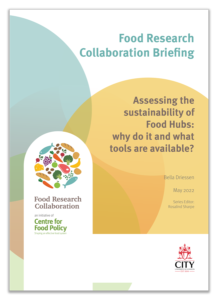Our food system needs to be sustainable: this is well understood and hard to deny. How we get there is a trickier question. Our research suggests that ‘sustainable food hubs’ (SFHs) could be part of the solution, but we need to better understand SFHs’ sustainability, and the ways they can be most impactful, before we can state their case to policymakers.
Understanding the sustainability of a food hub requires a way of assessing or measuring its impacts: what it uses up, what it emits, what it gives back, and what value it brings to lives and the local economy. This report considers what sustainability is and why we need to measure it, and discusses some of the factors that can limit the uptake and effectiveness of assessment tools. The report then provides an overview of some scale-appropriate assessments which already exist to measure different dimensions of sustainability.
This will provide valuable context for the Food Research Collaboration’s ongoing work with SFHs on sustainability assessment and reporting.


